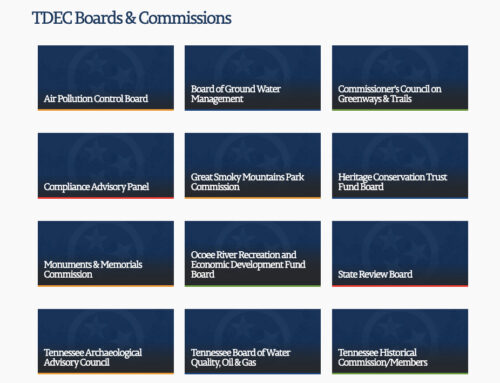Although lawmakers introduced several bills in the Tennessee Legislature this year to expand the ability of governing bodies to conduct electronic meetings without members having to be there in person, none passed.
Of the nine bills tracked by TCOG, six failed or stalled. The other three were modified to keep the status quo on electronic participation and not expand it.
The Open Meetings Act already allows members of state boards to participate in meetings electronically under certain conditions and rules. These rules are found in Section 108 of the Open Meetings Act. Members of school boards are also allowed to participate in meetings electronically within certain limits.
Bill would have allowed local legislative bodies to conduct hybrid electronic meetings
The legislation with the most impact bill would have allowed members of county commissions, municipal governing bodies and utility boards to participate in meetings electronically if they were experiencing a medical or family emergency, were out of the county for work or were called into military service. SB301 sponsored by Sen. Richard Briggs, R-Knoxville, was passed on April 14 by the Senate State and Local Committee on a 5-4 vote. But the House version, HB327 sponsored by Rep. Dave Wright, also a Knoxville Republican, failed in a voice vote in the House Finance, Ways and Means Subcommittee the next week. The Senate bill was then re-referred to the Senate Calendar Committee and never made it to the Senate floor for a vote before adjournment.
Another piece of legislation would have allowed members of local utility boards to participate in meetings remotely with fewer limits. Sen. Jon Lundberg, R-Bristol, presented SB508 in the Senate State and Local Committee, but after several questions and testimony, including by TCOG, a vote was not taken and the bill was assigned to the General Subcommittee. This action effectively shelved the bill. The bill was taken off notice by its House sponsor, Rep. Clark Boyd, R-Lebanon.
Both bills had been amended by the sponsors to add features such as a requirement that any meeting in which a member of the governing body was participating remotely would have to be recorded and the public would have to be allowed to listen to or watch the meeting remotely.
A third legislative proposal, HB1029 and SB971, had been filed with the intention to overhaul Section 108 of the Open Meetings Act based on experiences with electronic meetings during the COVID-19 pandemic. However, the sponsors, Rep. Jerome Moon, R-Maryville, and Sen. Shane Reeves, R-Murfreesboro, decided against moving the bill this year.
Bill sought to continue electronic meetings to slow COVID-19 transmission
Late in the session, the Tennessee Municipal League and Tennessee County Services Association proposed using HB1029 and SB971 as a vehicle for legislation to allow local governing bodies the ability to continue to meet electronically for safety during the COVID-19 pandemic in the event the governor did not renew an executive order allowing it.
The bill would have required a local governing body to make a determination of necessity for holding an electronic meeting by a majority vote of the members of the governing body before each such meeting, and the factors could only be related to reducing transmission of COVID-19 in group gatherings. Reeves agreed to sign over the bill to Sen. Page Walley, R-Bolivar, and the amended bill was passed by the Senate State and Local Committee in its final action before recessing for the year. However, the House had already closed its committees for the year and declined to reopen the state or local government committee to hear it.
Other bills sought to carve out electronic meetings for specific boards
Status of the six other bills that in some way expanded electronic meeting rules:
- Passed with changes. HB598 / SB677. This bill created a new Tennessee statewide child care task force. Original language permitted electronic meetings. But an amendment added language to say that the electronic participation by the state board members must be pursuant to rules already in place in Section 108 of the Open Meetings Act.
- Passed with changes. HB490 / SB118. This bill established a statewide medical cannabis commission. The bill as filed would have permitted electronic participation in meetings by board members. But the bill was amended to say that electronic participation must be pursuant to rules already in place in Section 108 of the Open Meetings Act for state boards.
- Passed with changes. HB622 / SB280. This bill made changes to human resource agency boards, including allowing the boards to meet electronically. The bill eventually passed but maintained the status quo on rules surrounding electronic participation by state boards without expanding them.
- Stalled. HB1202 / SB1394. This bill as filed would have allowed members of the 11-member state agency that administers certificates of need for health facilities and services to meet electronically. The bill was never heard, but likely would have been amended and expanded to deal with other issues related to certificates of need.
- Stalled. HB1021 / SB 1110. This bill as filed would have permitted the advisory council on the commercial explosives industry to conduct meetings by electronic means as long as the means utilized permitted all members to send and receive real-time audio. The bill, which likely was a caption bill, was taken off notice and never heard.
- Stalled. HB370 / SB221. This bill would have created a committee to advise the state health department on how and when to implement quarantine and disease communication tracking procedures, and removed quarantine authority from the health commissioner and county health officer. It included language to allow the new committee to meet by electronic or other means of communication. However, the bill was stripped down significantly in an amendment to only require certain reporting by health departments during an epidemic and no longer establishing a new committee. The bill passed the House, but stalled in the Senate.




